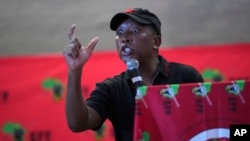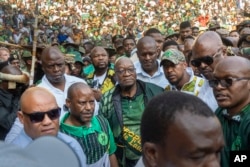Many South African political parties are using populist rhetoric ahead of what is being described as the most important election in 30 years.
One South African political party running in the May 29 elections wants mass expulsions of foreign migrants and the return of the death penalty. Another party regularly sings about killing White farmers. Yet another pushes for changing from “Roman-Dutch law” to African traditions and wants to send teenage mothers to a former prison island.
Gayton McKenzie, the leader of a small opposition party named the Patriotic Alliance and who spent 17 years in jail for robbery, speaks a law-and-order message.
“As a person that grew up as a gangster, that grew up as a criminal, a person that understands the underworld, I’m here today to tell you the only way to stop the crime, the killings,” he said at a rally earlier this year. “Under my regime, if you kill somebody, you shall be killed also. ... We want law and order back in South Africa.”
Like populist leaders the world over, he positions himself as an outsider taking on a supposedly elite and corrupt establishment.
Beyond advocating for the death penalty, he has also promised to “bring God back into schools.” Immigration is his other key theme, in which he constantly rails against undocumented migrants from other African nations, blaming them for most of the country’s woes — from the unemployment crisis to crime. He’s even raised the idea of building a border wall.
Political analyst Tessa Dooms said she sees similarities between the political rhetoric in South Africa and the United States under former President Donald Trump, who is seeking a return to power in November.
“I think what’s becoming clear in this election is that there is almost a Trumpian type of moment that is developing where people are resisting establishment politics and big political parties particularly because they feel like those parties are far removed from them, are not accountable to them, and are not engaged with them,” Dooms said.
The Economic Freedom Fighters, or EFF — the nation’s third-largest party — is South Africa’s original populist rabble-rouser. Its red-beret-wearing leader, Julius Malema, has twice been charged with hate speech and for firing a gun at a public rally.
The EFF advocates “radical economic transformation” — the nationalization of land and banks. Malema has also suggested arming the Hamas militant group.
Established less than a year ago, Umkhonto we Sizwe, or the MK party, which is predicted to get the third- or fourth-largest share of the vote, has also assumed the populist mantle.
It’s led and represented by former President Jacob Zuma, although he can’t run for parliament due to a 2021 prison sentence he was given for contempt of court.
Zuma, who was forced to resign as president in 2018 due to corruption scandals, has an axe to grind with his former party, the governing African National Congress. He also retains considerable popularity among fellow ethnic Zulus in his home province, despite allegations against him.
On the campaign trail this year, he has railed against South Africa’s progressive constitution, what he calls “white law,” and argued that traditional chiefs and leaders should be given more power.
He’s made derogatory comments about LGBTQ+ rights — which are protected by law in South Africa.
Zuma has also floated the idea of dealing with teenage pregnancy by sending young mothers to continue their education on Robben Island — the former prison where he and Nelson Mandela, who would also go on to become president, were jailed under Apartheid.
Another party, the right-wing Afrikaans party Freedom Front Plus, advocates for the secession of the Western Cape province, dubbed CapeXit.
As a country, South Africa has many conditions that make it fertile breeding ground for populism, analysts say. Unemployment is among the highest in the world, many still live in dire poverty, there are almost daily power cuts due to a flailing electricity grid, and there are high rates of murder and sexual violence.
“People are just exhausted and just want to know there are people who are going to fix things fast and are willing to do whatever it takes to get those things resolved,” Dooms said.
This month’s elections are being seen as pivotal, because 30 years after the end of apartheid, some polls project the ANC could get under 50% for the first time and be forced to enter a coalition government.
But with small populist parties on the rise, the concern now is who they would join with.






